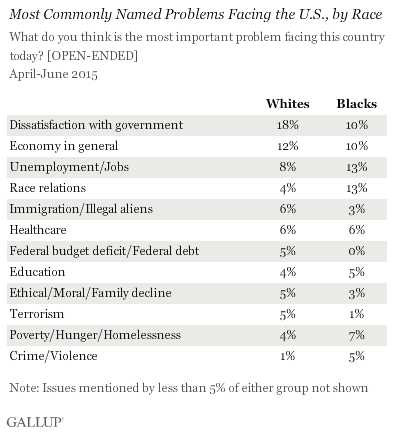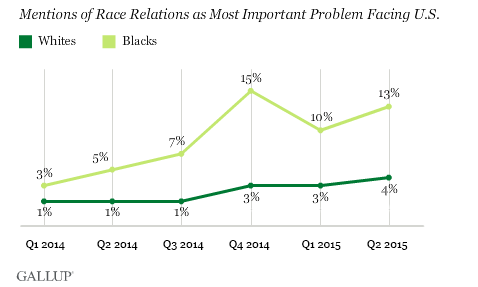The Gap Between Whites and Blacks on Race Relations is Troubling

By:
Just a week prior to the tragic Charleston mass shooting -- which is being investigated as a hate crime and described as an act of terror -- Gallup released a survey showing that African Americans rank race relations has the "most important problem" facing the United States. In the most recent quarter (April to June 2015), 13 percent of Black Americans responded that race relations were a top concern (tied with unemployment, which also ranked at 13 percent).
On the other hand, only 4 percent of white Americans named race relations as the "most important problem" facing this country, leaving a 9-point gap between where the two stand on the issue. For white Americans, 18 percent mention that government dissatisfaction is the "most important problem."
 Gallup - gallup.com
Gallup - gallup.com
That race relations weighs heavy for Black Americans is reflective of the national conversation about race sparked by the deaths of unarmed Black men and women at the hands of police. "A number of high-profile police incidents of unarmed black men in 2014 and 2015 sparked protests across the country and elevated discussion of race relations," Gallup's Alyssa Brown writes. "Three of the more highly publicized deaths involved Michael Brown in Ferguson, Missouri; Freddie Gray in Baltimore; and Eric Garner in Staten Island, New York."
And this is seemingly reflected in the numbers. In the first quarter of 2014, only 3 percent Black Americans surveyed mentioned race relations as a top problem (while only 1 percent of white Americans named it as a top issue). By December of 2015, the importance of race relations hit a high: 15 percent of surveyed Blacks responded that it was a large and looming problem. (For context, this was also during a heightened period of protests surrounding the deaths of Michael Brown and Eric Garner, though Gallup did not draw a direct correlation.) This year alone, the world reacted to the deaths of Walter Scott and Freddie Gray -- to name a few -- at the hands of police, and the treatment of a teenage girl by police in McKinney, Texas. (The Guardian launched "The Counted" to track civilian deaths at the hands of police.)
Gallup concluded the following:
"Just as blacks and whites differ in their views of race relations as a top U.S. problem, they also stand apart in their views on the fairness of the criminal justice system, confidence in police and the need for new civil rights laws. Gallup found last June that 68% of blacks said the American criminal justice system is biased against black people, significantly higher than the 25% of whites who said the same. And while 37% of blacks said they had a 'great deal' or 'quite a lot' of confidence in the police, 59% of whites said the same. Gallup has also found that blacks are much more likely than whites to say new civil rights laws are needed and that the government should be actively involved in improving minorities' economic and social status."
 Gallup - gallup.com
Gallup - gallup.com
This information comes during an election year, when candidates are vying for the African American vote. Earlier this year Hillary Clinton made a speech mentioning race relations, the police, and mass incarceration -- invoking the names of Walter Scott, Freddie Gray and others. Sen. Rand Paul has also been reaching out to the African American community.
However, each have made their respective faux pas. Clinton was criticized on Saturday for not specifically mentioning race in her first major speech.
Paul on the other hand made a glib comment about being glad his train didn't stop in Baltimore during the unrest following Freddie Gray's death.
